Malala accepts Nobel Peace Prize with rousing speech
Kailash Satyarthi and Malala pledge to fight for free, quality primary and secondary education for every child
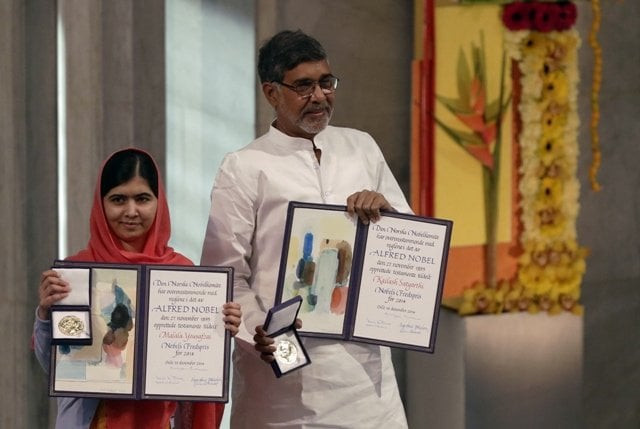

PTI chairman Imran Khan congratulates Malala
Congratulations 2 Malala on her Nobel Prize. Proud of her courage. She reflects aspirations of our youth, esp girls, 4 education as a right.
— Imran Khan (@ImranKhanPTI) December 10, 2014
.....................................................................................................................................................
Malala addresses the ceremony
Our Majesties, distinguished members of the Norweigan Nobel Committee, dear sisters and brothers, today is a day of great happiness for me. I am humbled that the Nobel Committee has selected me for this precious award.
Thank you to everyone for your continued support and love. I am grateful for the letters and cards that I still receive from all around the world. Reading your kind and encouraging words strengthens and inspires me.
I would like to thank my parents for their unconditional love. Thank you to my father for not clipping my wings and for letting me fly. Thank you to my mother for inspiring me to be patient and to always speak the truth- which we strongly believe is the real message of Islam.
Thank you to all my teachers. I am very proud to be the first Pashtun, the first Pakistani, and the first young person to receive this award.
I am pretty certain that I am also the first recipient of the Nobel Peace Prize who still fights with her younger brothers. I want there to be peace everywhere, but my brothers and I are still working on that.
I am also honoured to receive this award together with Kailash Satyarti, who has been a champion of children's rights for a long time. Twice as long, in fact, than I have been alive. I am proud that we can work together and show the world that an Indian and a Pakistani can work together and achieve their goals for children's rights.
Dear brothers and sisters, I was named after the inspirational Pashtun Joan of Arc, Malalai of Maiwand. The word Malala means "grief stricken", "sad", but in order to lend some happiness to it, my grandfather would always call me Malala – the happiest girl in the world. And today I am very happy that we are fighting together for an important cause.
we are fighting together for an important cause.
This award is not just for me. It is for those forgotten children who want education. It is for those frightened children who want peace. It is for those voiceless children who want change.
I am here to stand up for their rights, raise their voice ... it is not time to pity them. It is time to take action so it becomes the last time that we see a child deprived of education.
I have found that people describe me in many different ways. Some people call me the girl who was shot by the Taliban And some, the girl who fought for her rights. Some people, call me a "Nobel Laureate" now. However, my brothers still call me that annoying, bossy sister.

Nobel Peace Prize laureate Malala Yousafzai delivers her speech during the Nobel Peace Prize awarding ceremony at the City Hall in Oslo. PHOTO: AFP
As far as I know, I am just a committed and stubborn person who wants to see every child getting quality education, who wants equal rights for women and who wants peace in every corner of the world.
Education is one of the blessings of life—and one of its necessities. That has been my experience during the 17 years life. In my home in Swat Valley, in the north of Pakistan, I always loved school and learning new things. I remember when my friends and I would decorate our hands with henna for special occasions. Instead of drawing flowers and patterns we would paint our hands with mathematical formulas and equations.
We had a thirst for education because our future was right there in that classroom. We would sit and read and learn together. We loved to wear neat and tidy school uniforms and we would sit there with big dreams in our eyes. We wanted to make our parents proud and prove that we could excel in our studies and achieve those goals, which some people think only boys can.
But things did not remain the same. When I was ten, Swat, which was a place of beauty and tourism, suddenly changed into a place of terrorism. More than 400 schools were destroyed. Girls were stopped from going to school. Women were flogged. Innocent people were killed. And our beautiful dreams turned into nightmares.
Education went from being a right to being a crime. Girls were stopped from going to school. But when my world suddenly changed, my priorities changed too.
I had two options, one was to remain silent and wait to be killed. And the second was to speak up and then be killed. I chose the second one. I decided to speak up.
The terrorists tried to stop us and attacked me and my friends in 2012 but neither their ideas nor their bullets could win.We survived. And since that day, our voices have only grown louder.
I tell my story, not because it is unique, but because it is not. It is the story of many girls.
Today, I tell their stories too. I have brought with me to Oslo, some of my sisters, who share this story, friends from Pakistan, Nigeria and Syria. My brave sisters Shazia and Kainat Riaz who were also shot that day in Swat with me. They went through a tragic trauma too. Also, my brave sister Kainat Somro who suffered extreme violence and abuse, even her brother was killed, but she did not succumb.
Also my sisters here, who I have met during my Malala Fund campaign, who are now like my sisters, my courageous 16-year-old sister Mezon from Syria, who now lives in Jordan in a refugee camp and goes from tent to tent encouraging girls and boys to learn. And my sister Amina, from the North of Nigeria, where Boko Haram threatens and kidnaps girls, simply for wanting to go to school.
Though I appear as one girl, one person, who is 5 foot 2 inches tall, if you include my high heels. I am not a lone voice, I am many.
I am Shazia. I am Kainat Riaz. I am Kainat Somro. I am Mezon. I am Amina. I am those 66 million girls who are out of school.
Today, in half of the world, we see rapid progress, modernisation and development. However, there are many countries where millions still suffer from the very old problems of hunger, poverty and injustice.
There are still conflicts in which hundreds of thousands of innocent people have lost their lives. Many families have become refugees in Syria, Gaza and Iraq. There are still girls who have no freedom to go to school in the north of Nigeria. In Pakistan and Afghanistan we see innocent people being killed in suicide attacks and bomb blasts.
Many children in Africa do not have access to school because of poverty.
Many children in countries like India and Pakistan are deprived of their right to education because of social taboos, or they have been forced into child labour and girls into child marriages.
One of my very good school friends, the same age as me, had always been a bold and confident girl and dreamed of becoming a doctor. But her dream remained a dream. At age of 12, she was forced to get married and then soon had a son at an age when she herself was a child – only 14. I know that my friend would have been a very good doctor.
But she couldn't ... because she was a girl.
Her story is why I dedicate the Nobel Prize money to the Malala Fund, to help give girls everywhere a quality education and call on leaders to help girls like me, Mezun and Amina. The first place this funding will go is where my heart is, to build schools in Pakistan—especially in my home of Swat and Shangla.
In my own village, there is still no secondary school for girls. I want to build one, so my friends can get an education—and the opportunity it brings to fulfil their dreams.
That is where I will begin, but it is not where I will stop. I will continue this fight until I see every child in school.
Dear brothers and sisters, great people,who brought change, like Martin Luther King and Nelson Mandela, Mother Teresa and Aung San Suu Kyi, they once stood here on this stage. I hope the steps that Kailash Satyarti and I have taken so far and will take on this journey will also bring change – lasting change.
My great hope is that this will be the last time we must fight for the education of our children. We want everyone to unite to support us in our campaign so that we can solve this once and for all.
We have already taken many steps in the right direction. Now is the time to take a leap.
It is not time to tell the leaders to realise how important education is - they already know it - their own children are in good schools. Now it is time to call them to take action.
We ask the world leaders to unite and make education their top priority.
Fifteen years ago, the world leaders decided on a set of global goals, the Millennium Development Goals. In the years that have followed, we have seen some progress. The number of children out of school has been halved as Satyarti said. However, the world focused only on expanding primary education, and progress did not reach everyone.
Next year, in 2015, representatives from around the world will meet at the United Nations to decide on the next set of goals, the Sustainable Development Goals. This will set the world's ambition for generations to come.
Leaders must seize this opportunity to guarantee a free, quality primary and secondary education for every child.
Some will say this is impractical, or too expensive, or too hard. Or even impossible. But it is time the world thinks bigger.
Dear brothers and sisters, the so-called world of adults may understand it, but we children don't. Why is it that countries which we call "strong" are so powerful in creating wars but so weak in bringing peace? Why is it that giving guns is so easy but giving books is so hard? Why is it that making tanks is so easy, but building schools is so difficult?
We are living in the modern age and we believe that nothing is impossible. We have reached the moon and maybe soon will land on Mars. Then, in this, the 21st century, we must be able to give every child quality education.
So we must work ... and not wait.
So let us bring equality, justice and peace for all. Not just the politicians and the world leaders, we all need to contribute. Me. You. It is our duty.
Dear sisters and brothers, let us become the first generation to decide to be the last. The empty classrooms, the lost childhoods, wasted potential.
Let this be the last time that a boy or a girl spends their childhood in a factory.
Let this be the last time that a boy or a girl spends their childhood in a factory.
Let this be the last time that a girl gets forced into early child marriage.
Let this be the last time that an innocent child loses their life in war.
Let this be the last time that a classroom remains empty.
Let this be the last time that a girl is told education is a crime and not a right.
Let this be the last time that a child remains out of school.
Let us begin this ending. Let this end with us. And let us build a better future right here, right now.
Here is Malala Yousafzai’s @MalalaFund Nobel Diploma: #nobelprize2014 pic.twitter.com/LOSyZ15E1p
— The Nobel Prize (@NobelPrize) December 10, 2014
.....................................................................................................................................................
Pashto music legend Sardar Ali Takkar performs at the ceremony
Takkar, who hails from the same province as Malala Yousafzai is performing Ta Bibi Sheerina Ye, a song which he made as a tribute to Malala’s bravery after she was attacked by the Taliban.

.....................................................................................................................................................
Kailash Satyarthi's address
Our Majesties, Your Royal Highnesses, Excellencies, distinguished members of the Norwegian Nobel Committee, dear brother Tom Harkin, brothers and sisters, and my dear daughter Malala.
From this podium of peace and humanity, I am deeply honoured to recite a mantra from the ancient texts of wisdom, Vedas.
This mantra carries a prayer, an aspiration and a resolve that has the potential to liberate humanity from all man-made crises.
Let's walk together. In the pursuit of global progress, not a single person should be left out or left behind in any corner of the world, from East to West, from South to North.
I bow to my late parents, to my motherland India, and to the mother earth.
With a warm heart I recall how thousands of times, I have been liberated, each time I have freed a child from slavery. In the first smile of freedom on their beautiful faces, I see the Gods smiling.
I give the biggest credit of this honour to my movement's Kaalu Kumar, Dhoom Das and Adarsh Kishore from India and Iqbal Masih from Pakistan who made the supreme sacrifice for protecting the freedom and dignity of children. I humbly accept this award on behalf of all such martyrs, my fellow activists across the world and my countrymen.
My journey from the great land of Lord Buddha, Guru Nanak and Mahatma Gandhi; India to Norway is a connect between the two centres of global peace and brotherhood, ancient and modern.
Friends, the Nobel Committee generously invited me to deliver a "lecture.” Respectfully, I am unable to do that.
I represent here the sound of silence. The cry of innocence. And, the face of invisibility. I have come here to share the voices and dreams of our children, our children, because they are all our children.
I have looked into their frightened and exhausted eyes.
Twenty years ago, in the foothills of the Himalayas, I met a small, skinny child labourer. He asked me: "Is the world so poor that it cannot give me a toy and a book, instead of forcing me to take a tool or gun?"
I met with a Sudanese child-soldier who was kidnapped by an extremist militia. At his first lesson, he was forced to kill his friends and family. He asked me: "What is my fault?”
Twelve years ago, a child-mother from the streets of Colombia – trafficked, raped, enslaved – asked me this: "I have never had a dream. Can my child have one?”
There is no greater violence than to deny the dreams of our children.

Nobel Peace Prize laureate Kailash Satyarthi salutes the audience as he delivers his speech during the Nobel Peace Prize awarding ceremony at the City Hall in Oslo. PHOTO: AFP
The single aim of my life is that every child is: free to be a child, free to grow and develop, free to eat, sleep, see daylight, free to laugh and cry, free to play, free to learn, free to go to school, and above all, free to dream.
All the great religions tell us to care for children. Jesus said: "Let the children come to me; do not hinder them, for the kingdom of God belongs to them.” The Holy Quran says: "Kill not your children because of poverty.”
I refuse to accept that all the temples and mosques and churches and prayer houses have no place for the dreams of our children.
I refuse to accept that the world is so poor, when just one week of global spending on armies is enough to bring all of our children into classrooms.
I refuse to accept that all the laws and constitutions, and the judges and the police are not able to protect our children.
I refuse to accept that the shackles of slavery can ever be stronger than the quest for freedom.
I had the privileged of working with many courageous souls who also refuse to accept. We have never given up against any threat and attack, and we will never.
Undoubtedly, progress has been made in the last couple of decades. The number of out of school children has been halved. Child mortality and malnutrition has been reduced, and millions of child deaths have been prevented. The number of child labourers in the world has been reduced by a third. Make no mistake, great challenges still remain.
Friends, the biggest crisis knocking on the doors of humanity today are fear and intolerance.
We have utterly failed in imparting an education to our children. An education that gives the meaning and objective of life and a secure future. An education that builds a sense of global citizenship among the young people. I am afraid that the day is not far when the cumulative result of this failure will culminate in unprecedented violence that will be suicidal for humankind.
Yet, young people like Malala, I have started calling her my daughter Malala not just Malala, in fact Kainat too are rising up everywhere and choosing peace over violence, tolerance over extremism, and courage over fear.
Whose children are they who stitch footballs, yet have never played with one? They are our children. Whose children are they who mine stones and minerals? They are our children. Whose children are they who harvest cocoa, yet do not know the taste of a chocolate? They are all our children.
We need collective actions with a sense of urgency. Every single minute matters, every single child matters, every single childhood matters.
I challenge the passivity and pessimism surrounding our children. I challenge this culture of silence, this culture of neutrality.
I, therefore, call upon all the governments, intergovernmental agencies, businesses, faith leaders, the civil society, and each one of us, to put an end to all forms of violence against children. Slavery, trafficking, child marriages, child labour, sexual abuse, and illiteracy have no place in any civilised society.
As a child, I had a vision of tomorrow. That cobbler boy was studying with me in my classroom. Now, that tomorrow has become today. I am today, and you are today. today it is time for every child to have the right to life, the right to freedom, the right to health, the right to education, the right to safety, the right to dignity, the right to equality, and the right to peace.
Today, beyond the darkness, I see the smiling faces of our children in the blinking stars. Today, in every wave of every ocean, I see our children playing and dancing. Today, in every plant, tree, and mountain, I see that little cobbler boy sitting with me in the classroom.
I want you to see and feel this Today inside you. My dear sisters and brothers, may I ask you to close your eyes and put your hand close to your heart for a moment? Can you feel the child inside you? Now, listen to this child. I am sure you can, listen to that child.
Today, I see thousands of Mahatma Gandhis, Martin Luther Kings, and Nelson Mandelas marching forward and calling on us. The boys and girls have joined. I have joined in. We ask you to join too. Let us democratise knowledge. Let us universalise justice. Together, let us globalise compassion.
I call for a march from exploitation to education, from poverty to shared prosperity, a march from slavery to liberty, and a march from violence to peace.
Let us march from darkness to light. Let us march from mortality to divinity.
Let us march!
Look at @k_satyarthi Nobel Diploma! #nobelprize2014 pic.twitter.com/nvYAXR7Uc5
— The Nobel Prize (@NobelPrize) December 10, 2014
.....................................................................................................................................................
Narendra Modi congratulates Malala
I also congratulate the young Malala Yousafzai for the momentous achievement.
— Narendra Modi (@narendramodi) December 10, 2014
.....................................................................................................................................................
Malala receives the Nobel Peace Prize
After presenting the prize to Kailash Satyarthi, the chairman presents the prize to Malala.

PHOTO: AFP
.....................................................................................................................................................
Rahat Fateh Ali Khan performs
Renowned vocatalist Rahat Fateh Ali Khan takes the stage to perform Allah Hu.

Express News screengrab of Rahat Fateh Ali Khan performing at the ceremony.
.....................................................................................................................................................
Norwegian Nobel Committee chairman's opening speech
Addressing the ceremony, Chairman of the Norwegian Nobel Committee, Thorbjørn Jagland said, “Satyarati and Yousafzai are precisely the people who should receive the Nobel Prize.”
Malala Yousafzai is far and away the youngest peace prize Laureate of all time. Her story has nevertheless become known practically all over the world.
Sharing her journey, the chairman said, “ When she was 11 or 12 she began under a pseudonym to write a blog for the BBC about what it was like to live in the Swat valley in northwest Pakistan, under heavy pressure from the Taliban and with only ambivalent support from the Pakistani authorities. The schools periodically had to close, especially girls’ schools.”
“Malala Yousafzai’s vision was clear right from the start. Girls had a self-evident right to education. Her courage is almost indescribable. We all know what happened on October 9, 2012, when Malala was 15. A gunman climbed into the school bus and asked for Malala. He fired three shots at her, injuring her most severely. Her life was saved, and she decided to continue her struggle for girls’ education, although Taliban have made no secret of their intention to try again."
Further, Jagland continued, "Pakistan’s population numbers nearly 200 million. One quarter are between 5 and 16 years old. The nation’s constitution guarantees all these children free and compulsory education. But nearly half the 52 million do not go to school; a large majority of them are girls. And it is not just Taliban that seeks to keep the girls away from school. The authorities do so, too, having built schools without walls, without running water, and without toilets. And at least as important: indoctrination is sometimes more important than the skills and knowledge needed in order to cope in a modern world. The teachers, too, often lack the minimum qualifications needed."
"Pakistani authorities have praised the award of the Peace Prize to Malala Yousafzai. The best gift they could give her would be dramatic improvements to the country’s education system. That would benefit the whole of Pakistan."
The chairman of the Nobel Committee said, "Few things provide a larger economic and social yield than investments in girls’ education.
This logic applies all over the world. By placing the individual person at the centre of all politics, one will soon see that those "excluded" are not a burden and a threat, but an enormous unused resource. Here in Europe, too, such logic would work wonders. The problem here is not that children and adolescents receive no education or are obliged to work. Far too many find no use for their education or find no opportunities for work."
"We need to leave this negative situation and instead give the younger generation the hope which is probably our strongest defence against extremism," Jagland added.
"Young people must be able to see into the future instead of being trapped by dark thoughts and dark forces," he said.
"Ladies and gentlemen, While it is in the nature of extremism to create enemies and frightening images, and to divide the world into us and them, the laureates show us something else: A young girl and a somewhat older man, one from Pakistan and one from India, one Muslim, the other Hindu; both symbols of what the world needs: more unity. Fraternity between the nations!"


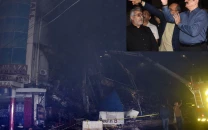
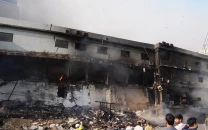
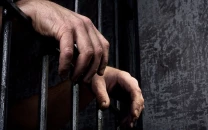
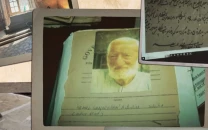
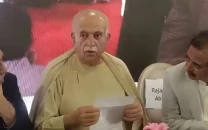
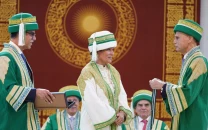
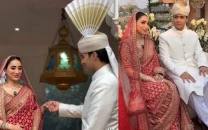
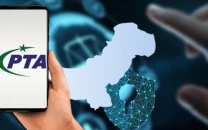
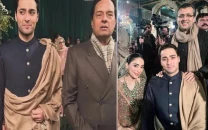
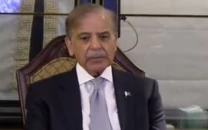
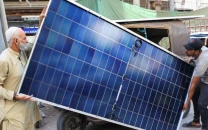






COMMENTS
Comments are moderated and generally will be posted if they are on-topic and not abusive.
For more information, please see our Comments FAQ